#Starfleet intelligence
Explore tagged Tumblr posts
Link
Chapters: 10/10 Fandom: Borderlines Rating: Mature Warnings: No Archive Warnings Apply Characters: Ensemble Cast - BAN, Saavik, Chandrelle et Prehaska ne Songet | Chandra, Jamie ‘Croft’ Blackthorne, Siobhan Lincolnton, Decker Sinclair Additional Tags: Espionage, Romulans, Deltans, Crew as Family Series: Part 1 of Borderlines: Banshees and Renegades Summary:
It is the late 23rd Century. After the discovery that the inhabitants of Milanet V, a hidden planet on the wrong side of the Romulan Neutral Zone, are closely related to the natives of Mid’la, or O’Ryan’s Planet, Starfleet Intelligence ups their game on Operation Vandal, an attempt to subvert the totalitarian rule of the Praetor Prime. All while keeping Klingon Separatists, the remnants of the Khitomer conspiracy, Section 31, and those on both worlds who are jockeying for power, at bay.
As the crews of two Federation starships, the USS Yorktown and the USS Titan, as well as various marines, Border Patrol cutters, and Starfleet Intelligence will discover, the background of the conspiracy will lead them to a threat to peace that has its origins before the Federation was founded. From a time that Jonathan Archer and the crew of Earth’s Enterprise held the soul of Vulcan in their hands.
The burden will especially fall on two undercover Starfleet operatives in the Romulan Star Empire, one an experienced operative, the other on her first covert mission. They will discover the seeds of a threat to the Federation and Vulcan that could bring the galaxy to the brink of war.
#star trek#borderlines#nyota uhura#original characters#romulans#border patrol#starfleet intelligence#in between the stories you know#adventures in fanfic writing
2 notes
·
View notes
Text
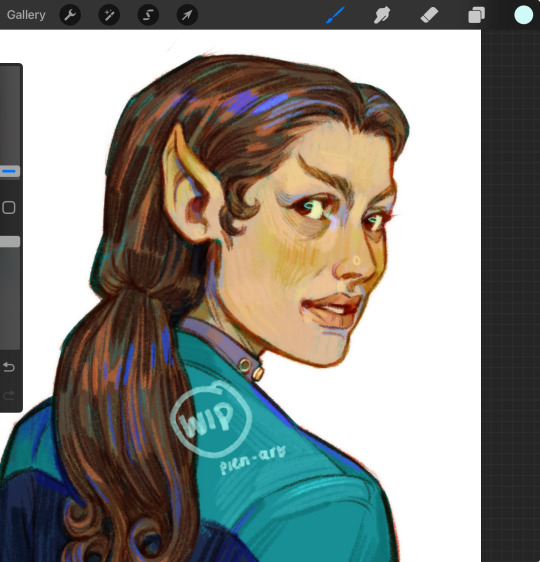
ok im still fleshing out this Wheel of Time - Star trekAU but hgnn!! Half Vulcan Moiraine my love. She is most certainly NOT blushing at the sight of Captain Sanche. Not at all.
#my art#wheel of time start trek au#me and meepy were talking about this (tysm meepy for your thoughts)#and to me (for now at least) i think of her as a historian/researcher#She spends periods doing weeks or monthlong research at research outposts#but she also works on starships#bc her knowledge of different cultures is very vast#and she may or may not have been recruited by starfleet intelligence straight out of the academy#bc anyone raised by damodreds has learned the skill of obtaining information#MUCH TO THINK ABOUT EITHER WAY#moiraine damodred#vulcan#wot#star trek
460 notes
·
View notes
Text

#lore star trek#lore soong#benjamin sisko#star trek deep space nine#star trek movies#montgomery scott#doctor beverly crusher#gates mcfadden#star trek the next generation#st tng#outer space#science fiction (genre)#ss enterprise#space ship#starfleet#andorian#james t kirk#captain kirk#uhura#nyota uhura#lieutenant uhura#pavel chekov#ensign chekov#androids#artifical intelligence#lore war#star trek the original series#star trek tos#star trek aos#star trek au
24 notes
·
View notes
Text
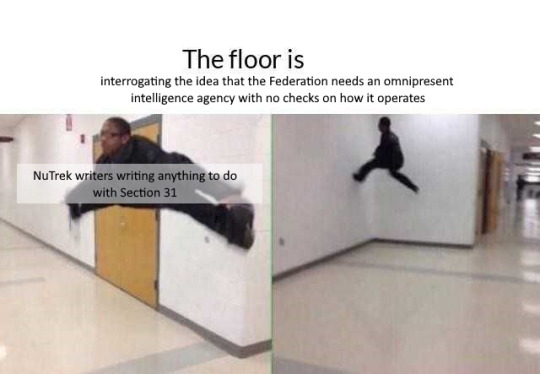
...so guess who's rewatching star trek discovery
#star trek#star trek discovery#section 31#i don't actually mind section 31 as a narrative element it just needs to be done right#and it rarely has been since its introduction#the narrative purpose section 31 serves is to be like 'hey maybe the Federation Isn't Perfect'#or like 'maybe it's got some systemic problems that are being allowed to continue because they benefit the people in power'#if you just treat it like another part of starfleet/the federation that just has a few bad apples it loses that narrative purpose#because the entire point of it is that it IS the bad apple and it IS spoiling the bunch simply by existing as itself#and that if the federation wants to have any chance at all of actually being what it claims to be#then section 31 and what it represents needs to be excised#you simply CANNOT have 'unambiguous postscarcity utopia' and 'omnipresent unrestricted intelligence agency' at the same time#at least not if you want to have any degree of narrative consistency#the last time i watched this arc in discovery was before i got into ds9 (and met mars!! ily airota) and it's almost unbearable now
47 notes
·
View notes
Text

why would someone make a star trek au of their own ocs lol that's so silly.
so agent west is now lieutenant commander west, starfleet intelligence, and dr vasilevsky is now dr vaskil, biotech researcher for the obsidian order (explanation below cut)
starfleet catches wind of suspicious activity around a remote moon that just so happens to be where dr vaskil is conducting her research. west is sent in undercover as a cardassian lab technician to gather information about what they are doing. however, dr vaskil is good at what she does and recognises that west has been surgically altered, so she kidnaps her and nonconsensually reverses the surgery. vaskil inevitably plants some sort of nefarious tech inside her during the surgery that west is unaware of, and does a villain monologue while she's strapped to the table. west manages to escape, but is stranded on the moon for the time being. a game of cat and mouse ensues where the roles are constantly switching. and of course so begins the fucked up psychosexual lesbian happenings
#star trek#star trek oc#star trek ds9#cardassian oc#oc: agent west#oc: dr vasilevsky#i have no idea where exactly the starfleet intelligence uniform actually comes from i just found it on a reddit post#and cardassian fashion is just fucked up man#i also drew a sketch of them up to their usual nonsense (holding weapons to each other's throats in like a sexually charged way)#but alas i wasnt happy with it 😔 maybe ill return to it at a later date#these two are so special to me. they mean everything
12 notes
·
View notes
Text
they smelled the repressed homosexuality on o'brien and said we neeed him taken under the wing of a crime syndicate member as a double agent
#and they were right.#even if its crazy for starfleet intelligence to recruit a guy whos not even an officer lol#me.txt
4 notes
·
View notes
Text
The 1st episode of Shield Podulation is up on Spotify. We talk S3E9 of #StarTrek #Picard, Vox
#Star Trek#Picard#Jack Crusher#Starfleet#Borg#Therapy#Podcast#7 of 9#Search Engine Optimization#Artificial Intelligence#Spotify
2 notes
·
View notes
Text
i'm just here following all the star trek blogs because... love. and then i'm like, oh i'll make wanda a verse and i'm like... she would just be a traveller. like join up? starfleet? if she didn't get her powers, she'd be a traveller, baby. explore the universe.
but yeah if she did join she'd be amongst the intelligence officers. she's not going out there and doing stupid shit, but if you need help gathering information she has contacts from many travels. good with a strategy. cool under pressure. is good.
#ooc#wanda just part of starfleet intelligence#she's not mechanically minded nor has she tried to be#she'd never be part of any flight crew#and look she can fight but don't make her#let her explore
3 notes
·
View notes
Text
Kobayashi Maru
An AI-penned Star Trek prequel that's supposed to be focused on Kirk at the Starfleet Academy (sort of expanding on the time between Kirk meeting Pike and being accused of cheating by Spock.) Unfortunately without actors, the artificial intelligence scrambles for associated references to "Kobayashi" and "Maru" so the film ends up being six hours of a Japanese Scottish Fold cat jumping in and out of boxes in a simulation of a starship bridge.
#bad idea#movie pitch#pitch and moan#star trek#prequel#starfleet#starfleet academy#kirk#kobayashi maru#maru#maru the cat#cat#scottish fold#boxes#starship#starship bridge#ai#artificial intelligence#writers strike#writers strike 2023#wga#wga strike 2023#wga strong#wga strike#sag#sag strike#sag aftra#sag strong#actors strike
6 notes
·
View notes
Text
The Federation didn't do that, Odo did that. The crew of DS9 had to steal the cure because the Federation wouldn't give it up.
I've seen several cases where people are like "what happens if we meet aliens, and then they see Independence Day or War of the Worlds?"
But nobody seems to think about what happens when the aliens see Star Trek.
The aliens are gonna see these shows made by a bunch of humans but they put putty on some of the humans to make them look like what we think aliens might look like, and we told stories about how those aliens would be our friends and we'd explore the universe with them and find more aliens and try to be friends with them too!
Yeah sometimes they'd be mean and we'd fight but we'd always try to avoid it and even if we fought we'd try to be friends later.
We basically created 900 episodes of a child's drawing of a stick figure of a human and a stick figure of a grey alien holding hands and "best friends" written in crayon.
#also have you seen the way section 31 has just been incorporated into the narrative as basically Starfleet Intelligence But More#like maybe they were originally intended to be a rogue faction#but at this point in time they are an officially sanctioned branch of the federation
23K notes
·
View notes
Text
We're always looking for new crew. Come check us out on discord and consider joining our game! We're a Starfleet Intelligence ship in 2416, set in a Prime AU (splitting from the Prime universe around the time of the Romulan Nova).
Join us on Discord, follow us on Mastodon, and check out our game site.
0 notes
Text
Ramblings on Kathryn Janeway

I hate it when people criticize Kathryn Janeway by calling her inconsistent thus incompetent. She was not. She was new to the job.
People who are new to something have a lot of growing pains before they come into their own, even if they've done a similar job for years before.
Voyager was her first solo command assignment, and her first mission was supposed to be low hanging fruit. All she had to do was run into the Badlands in this state-of-the-art ship that, in theory, should very easily be able to catch the banged up Ford Pinto of a ship captained by Chuckles.
There was never an intention of sending her on some extended mission in which she was isolated from literally every person in Starfleet Command.
New-to-the-Job people leaders are not left alone to solo command in a vacuum because they still need mentoring and training on the job. Like all people in new positions, they need oversight as they learn and grow. Like all people in command positions, they should have easy access to counseling so they can further develop their emotional intelligence.
She had NONE of that.
What she had was a history in which she was raised by a career Starfleet officer and officer's wife, a solid Starfleet career of her own, and the ethics and morality that comes from those two things combined. In the world from which she came, which was post TNG but pre-Dominion War, she was exactly the right officer to be promoted to captain because she strongly held onto the belief that the Prime Directive was to be followed, exploration to be expected, and people above all else.
However, as she progressed through the Delta Quadrant, she had to learn and come to terms with the fact that all three of those things were no longer absolute in their truth. We see those growing pains in episodes like 'Tuvix' and 'Equinox'.
She wasn't inconsistent. She was floundering because what she thought she knew didn't align with her actual reality, and she had no one to turn to for guidance, mentoring, or support.
The Kathryn Janeway we know at the end of Season 7 is not even close to the Kathryn Janeway of Season 1. The older Janeway is road wary, jaded, a little cynical, and, while she still believes in the Prime Directive, exploration, and her people, she has learned through trial and error that all of those things live in a gray area, that it's all relative. It is not an absolute. She hits that stride around Season 6, and that's when you see her start to make command decisions not just on the ideals and principles of Starfleet but on her own judgement based upon the experience she's finally gained as the CO.
In the seven years we watched her, what we saw was her growing into her rank. You don't get promoted and are immediately a well-seasoned, strong, agile commander. A lot of that comes with time, experience, and mentorship. She had two out of three of those things.
All things considered, she was a damned good captain and extremely competent.
174 notes
·
View notes
Text
An assortment of thoughts regarding one of my current fandom obsessions, being Garak/Bashir and all related fanfic and the fic tropes I love
Julian Bashir is Peak Hot Alien by Cardassian standards. Like, yes, he is a weird color and has no ridges, but he’s lithe and lanky and has a great neck. He also likes to argue in public; the average Cardassian thinks “go you, Garak, and if you don’t, I will.”
Elim Garak, when considering the point above, struggles to think Julian is not the perfect honeypot dreamed up by Starfleet Intelligence. Extra points if this is pre-Wire Garak having a future vision and can’t believe someone could fall in love with him and still know him for real.
The idea that Garak’s appeal to Julian is not really the Spy, but someone who sees all of Julian and doesn’t think it’s Too Much but is actually Just Right. Because Dr Julian Subatoi Bashir likes to talk and hyper fixate and argue and most people find that a bit exhausting and/or annoying. But Garak doesn’t; he lets Julian talk and argues back and even if he doesn’t Get whatever Julian is going on about, he still delights in the interaction. (I don’t think badly of Jadzia or Miles or anyone else for their reaction; the point isn’t that Garak is “better” the point is that a key difference between good friend and life partner is someone you synch with.)
A guilty pleasure for Bashir whump where the Bad Guys (usually Dukat or Tain) do Bad Things to Bashir because they want to hurt Garak (emotionally). Tropey and cliche as heck but so entertaining to read. So much whump! Bashir processing the whump was incidental to him and all about Garak! Garak processing same! Ps The world really needs more Tain vs Bashir fics.
Garak being Incredibly Repressed but also So Soft. It’s all in the actions and not the words. Verbally insisting he is above sentiment while doing so much pining. Pure 2005 movie Mr Darcy flexing his hand after holding Elizabeth’s hand to help her into the carriage levels of repressed attraction.
#elim garak#julian bashir#garashir#ds9#star trek ds9#garashir tropes#fanfic thoughts#star trek deep space nine#I have another unfinished post re Tain vs bashir#seriously untapped potential there
123 notes
·
View notes
Text
never mind the fact that this effect only lasted till the very last few seconds of that episode and he became intolerable (affectionate) once more
never getting over the fact that deep space nine medically transed quark in order to save the ferengi alliance and when he detransitioned it fixed his glaring misogyny so well he changed how he treated his female employees
#intolerable (affectionate) is how I imagine Kira would describe him in her logs#Odo would simply recommend Starfleet extradite him to a Sec31 deepsite in each log#with Starfleet Security/Intelligence sighing longsufferingly each time
45 notes
·
View notes
Text
Because she was an intentionally mysterious woman initially only seen in a single episode, and before she got an on-air backstory in the recent streaming series, Star Trek supplementary material developed contradictory information on who - or what - Number One, the female first executive officer of the Enterprise, was. To my count, she has four different, completely incompatible backstories in the comics and novels, and this is absolutely unique in Star Trek, which usually keeps it consistent.
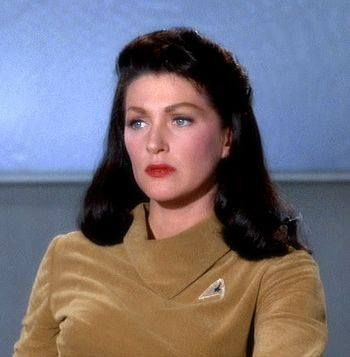
Peter David, in his New Frontier novels, identified Number One as a long lived immortal human mutant (like Flint from the original series) named “Morgan Primus” who was an early genius in cybernetics and artificial intelligence, which is why the Enterprise computer has her voice. One of the names Morgan Primus assumed to hide her immortality was Morgan Lefler, and one of her daughters was Robin Lefler, Wesley Crusher’s love interest from the Next Generation Series played by Ashley Judd. Robin Lefler did not inherit her mutant ability to heal all injuries.
Alternatively, the DC Star Trek Comics of the early 1980s said that Number One was from an obscure planet of peaceful, open, friendly telepaths who resemble humans exactly, and that she was present at first contact with Starfleet. They explained that her blunt, direct, undiplomatic manner is due to her being from a telepathic culture that values total honesty. This would make her the first telepath on the Enterprise, with Spock and Arex coming later. Her planet was created before the Next Generation, but her species being a peaceful, open, telepathic race resembling Mediterranean humans who are not well known or commonly encountered in the original series era….well, that certainly sounds an awful lot like Betazoids to me. If this backstory is true, she may have been the first Betazoid seen on screen, in much the same way fans generally believe Trelane was either Q or a member of the Q Continuum.
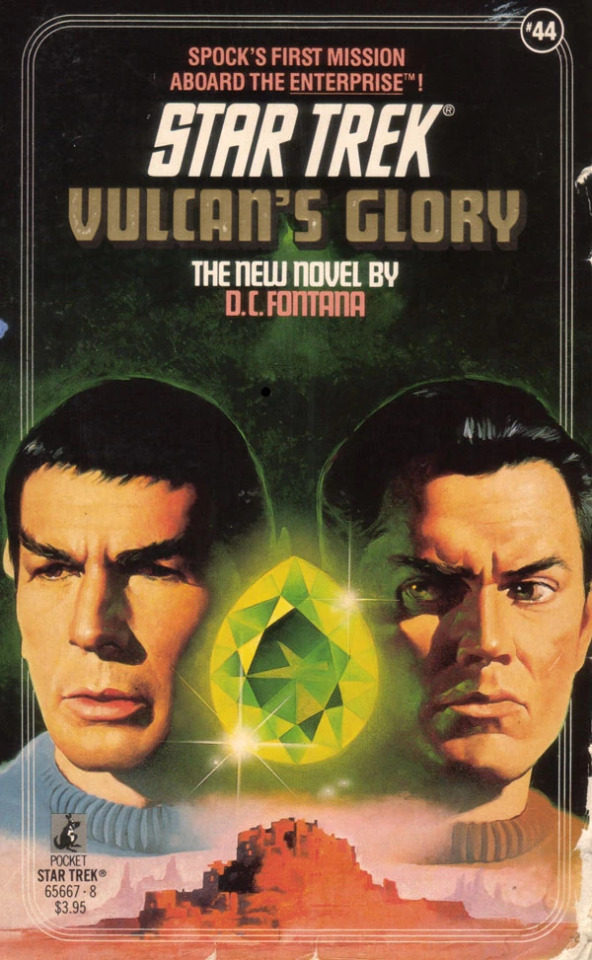
D.C. Fontana’s only Star Trek novel, “Vulcan’s Glory,” was one of the earliest attempts to give the character a backstory, and was the most consequential long term. The first novel set in the era of the first Star Trek pilot with Captain Pike and a young Spock, "Vulcan's Glory" identified Number One as being an Illyrian, a race of human-like beings who specialize in species wide breeding programs and genetic improvement. This genetic superiority is why she was cool, intellectual, aloof, and a bit arrogant. Her nickname “Number One” came from the fact she was the supreme product of the hyper-competitive Illyrian system, and won at everything from academics to athletics. According to DC Fontana, her actual Illyrian name is impossible to pronounce, so when dealing with humans, she assumed the human name “Una Chin-Riley.” Una of course, being “Number One” in Greek.
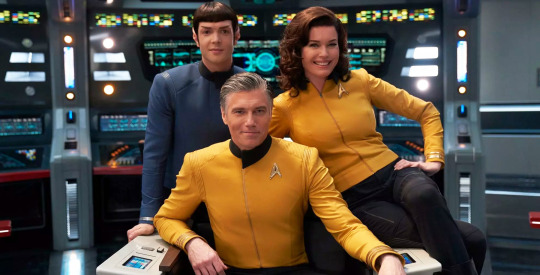
As DC Fontana is such an important figure in Star Trek history and only actually wrote one Star Trek novel in her life, many future materials used the backstory established in “Vulcan’s Glory,” like the David Stern Pike-era novels of the 2010s....but more importantly, the Discovery and Strange New Worlds series, which canonized the “Una Chin-Reilly” name by using it on screen (I remember gasping when Pike called her Una in a Discovery episode, meaning they were going with the Fontana backstory, a detail that may not have been significant to the casual viewer). Since DC Fontana wrote “Vulcan’s Glory” in the 80s, a lot more information was learned about the role of genetic engineering in the Federation, however, and interesting things were done in that series to bring her in line with everything we’ve learned since in Deep Space 9 and Enterprise about augmentation and the society wide prejudice against it. For example, they established that the fact Number One was Illyrian was not public knowledge, but that she pretended to be human her entire life.
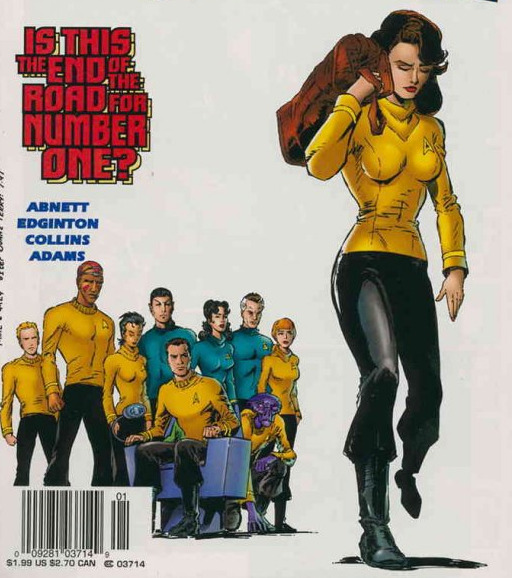
The one person who didn’t see fit to give her a backstory or even a real name was John "Johnny Redbeard" Byrne in his comic series about the Cage era Enterprise, who thought the mystery of the character was the most interesting thing about her, and he was deliberately cagey about any details. To Johnny Redbeard, she was just “Number One.” There was a running joke that every time someone says her actual name, or when we see her personnel file, it was blurred out, or somebody’s thumb was over it, and so on. It was rather like the running joke where Mr. Burns never remembers Homer Simpson's name. Johnny Redbeard loves mystery men and women who don't talk about their past, since that was the characterization he famously gave to Wolverine in his X-Men comics.

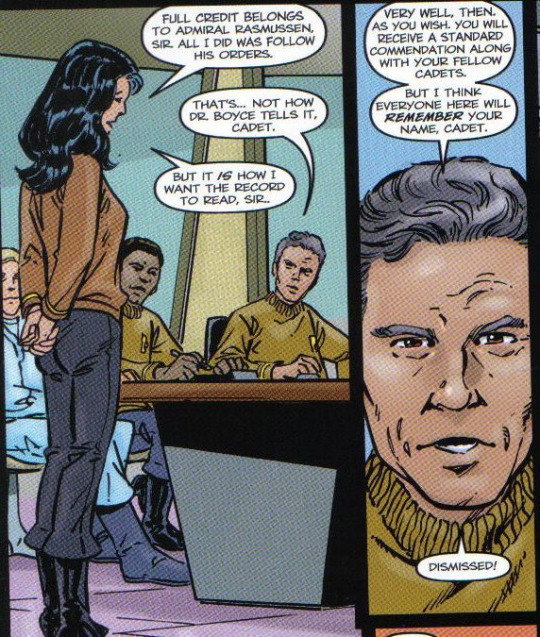
The one detail of Number One's past that is clear is that Number One in Byrne's comics is competent, mysterious, and has mystique, certainly, but she is completely human, without any powers. Byrne always got exasperated that his X-Men co-creator Chris Claremont added fantastical and far out details to the background of X-Men characters (like how Nightcrawler's girlfriend Amanda turned out to be a sorceress) because he felt "some people should just be allowed to be normal." Byrne always said his original idea for Wolverine's "true" backstory was that he was a Vietnam veteran in intelligence who volunteered for bionic experiments that wiped his memory, and disliked the idea he was immortal, and vetoed the very, very early Dave Cockrum idea Wolverine was an actual mutated wolverine who achieved sentience and a human shape (which early X-Men comics hint at). Byrne was reportedly enraged that they gave Moira MacTaggart a mutant power, as he saw her as just being a scrappy Scottish housekeeper.
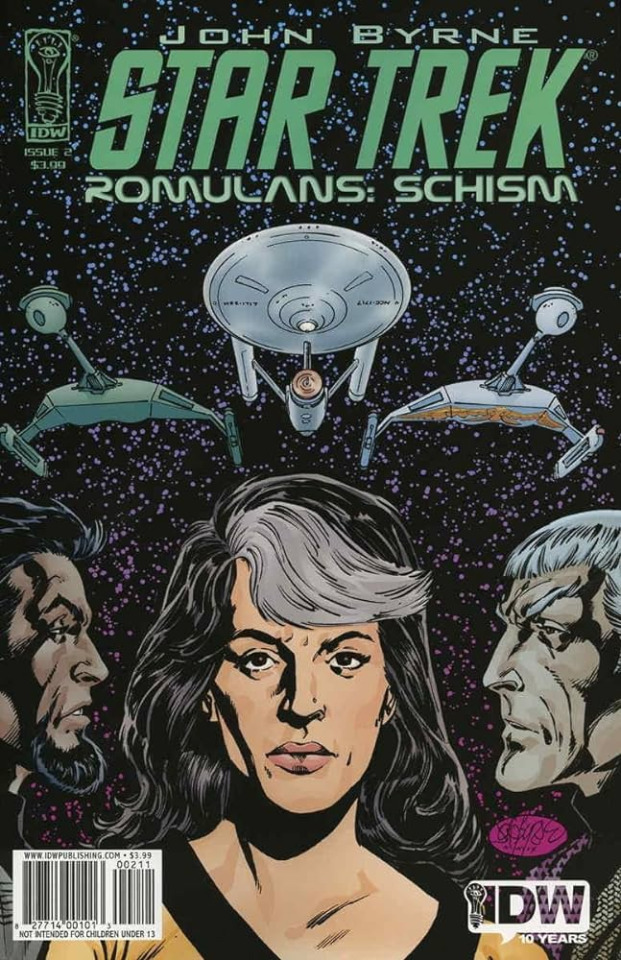
Johnny Redbeard didn’t give Number One a past (other than to show she was on the Enterprise's shakedown cruise with Robert April as a rookie officer), but he did give her a future, as he showed an older Number One as a starship commander in the Kirk era (aging gracefully with a white tuft like Tongolele), and later, a flag officer in the Motion Picture era.
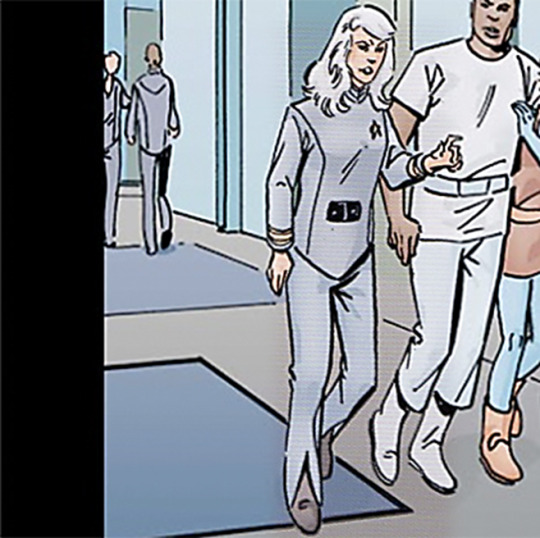
To what extent are these backstories compatible? Well, with what we currently know about Number One, that she hid her true species and status to avoid prejudice, it could be that some of the other versions were tall tales she spread to obscure her true origins. The John Byrne idea she served as an Ensign with Robert April in the Enterprise's very first mission hasn't been confirmed, but hasn't been denied, either. The Peter David "Morgan Primus" backstory is completely incompatible, but perhaps there are some elements to it that are true, like the idea that the early part of her career involved working as a computer engineer in artificial intelligence, which is why the computer has her voice.
604 notes
·
View notes
